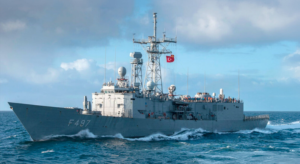Athens and the Ministry of Foreign Affairs are seeking to defuse a situation that could escalate into a serious incident, potentially undermining Greek-Turkish rapprochement and reigniting tensions in Greek-Turkish relations. This is happening while the Italian ship Ievoli Relume continues its operations south of Kasos and Karpathos.
The exit from the currently controlled crisis is not an easy matter, as Turkey attempted to exploit the investigations of the Italian ship to challenge Greek sovereign rights, nullify the demarcated Greek EEZ based on the Greek-Egyptian Agreement, and reinforce the Turkey-Libya Memorandum and, through it, its so-called “Blue Homeland” doctrine, by usurping the entire Greek continental shelf in the Eastern Mediterranean.
The Ministry of Foreign Affairs tried to keep a low profile, with diplomatic sources even stressing that there is no tension, hoping that the use of communication channels would have an immediate effect and lead to the resolution and management of the emerging crisis. The tension in the area comes after a difficult two days in Cyprus, where the heightened rhetoric of the Turkish leadership and the barrier raised by T. Erdogan on the Cyprus issue, now officially advocating a two-state solution, are testing the resilience of Greek-Turkish rapprochement.
The Italian ship Ievoli Relume, however, is conducting surveys for the laying of a cable (for the Greece-Cyprus electrical interconnection) based on legal NAVTEX issued by the Heraklion station, which concern areas within Greek territorial waters and a small area 6.5 nautical miles from the coasts of Karpathos, which, however, falls within the Greek demarcated EEZ based on the Greek-Egyptian Agreement. It is also in a location that falls within the area of potential extension of Greek territorial waters to 12 nautical miles, as granted by the Law of the Sea Convention.
It is perhaps the first time that Turkey, both through the NAVTEX it issued and the dispatch of warships to the area, directly and on the ground challenges the Greek-Egyptian Agreement on the partial delimitation of the EEZ. This Agreement was Greece’s response to the Turkey-Libya Memorandum, as with an international and valid interstate Agreement, based on the provisions of the Law of the Sea, the EEZ delimitation between Greece and Egypt was inserted and overlaid the dubious Turkey-Libya Memorandum. Thus, it also practically contested Turkey’s unilateral submission of coordinates with the supposed external boundaries of the Turkish EEZ, which left Greece only the territorial waters of 6 nautical miles around the islands and usurped the entire Greek continental shelf, naming it “Turkish.”
Indicative of the tension prevailing in the area is that on Monday, the Heraklion Station issued a NAVTEX (715/24) for an air-naval exercise in a large area southwest of Kastellorizo today, Wednesday, and Turkey followed with its own NAVTEX (700/24) for an exercise southwest of Kastellorizo in an overlapping area for tomorrow, Thursday, while Turkey issued one of its “usual” NAVTEX (0699/24), demanding the exclusion of the Dodecanese and other Greek islands from exercise planning with the argument that they are supposedly under a demilitarized status.
What is happening off Kasos and Karpathos, with Turkey’s attempt to militarize the incident by sending Turkish warships to monitor the movements of Ievoli Relume from a distance, naturally provoked a Greek response with the dispatch of a frigate, a gunboat, and a fast patrol boat of the Coast Guard to the area, while another frigate is on alert on a Dodecanese island to rush to the area if required.
This concentration of naval forces facing each other has sounded the alarm, as if there is no disengagement agreement, it creates an extremely dangerous situation in the area.
Exit Options
The options for an exit are specific: Turkey must accept the Greek-Egyptian Agreement, which nullifies the Turkey-Libya Memorandum, and not react to the investigations of Ievoli Relume in this area, which is outside Greek territorial waters but within the Greek EEZ. This possibility should be excluded due to the importance Turkey attaches to the Blue Homeland Doctrine and because Mr. Erdogan would not want to be accused domestically of retreating from national policies to achieve appeasement from Greece and the EU.
The other option is for the Italian ship, by order of the company, to modify its survey program and stop within Greek territorial waters without proceeding to the disputed area.
The third option is for the company managing the Italian ship to rush to request and notify the Turkish authorities of its work in the specific area of the Greek EEZ to avoid potential harassment by Turkish warships.
However, the latter two scenarios would create serious negative precedents against Greece. Either it will be de facto accepted that Turkey can cancel the exercise of Greek sovereign rights by the threat of force, or Turkey will achieve, through blackmail, the “grey area” demarcation of a Greek EEZ area which could potentially turn into a fully sovereign area of Greece in a future extension of territorial waters. Because this result would be led by the submission of a request by the managing company of the Italian ship also to Turkey for the issuance of NAVTEX.
A negative precedent had occurred in the previous days when the Italian ship TELIRI (as revealed by Protothema.gr), to complete the laying of a telecommunications cable in the Eastern Mediterranean, addressed not only the authorities of Greece and Cyprus for the issuance of NAVTEX and the reservation of areas but, to avoid harassment from Turkey, also sent a request to the Antalya Station. The latter issued a NAVTEX for areas concerning the Greek and Cypriot continental shelf in an attempt to create faits accomplis.
Now, the critical point of this brewing crisis will be today, as the Ievoli Relume’s surveys are expected to be completed, revealing whether the Italian ship will proceed according to the coordinates specified by the Greek NAVTEX without a Turkish attempt to obstruct it, or if it will stop its mission before entering the disputed area, or if it will finally seek permission from the competent Turkish authorities.
Ask me anything
Explore related questions





